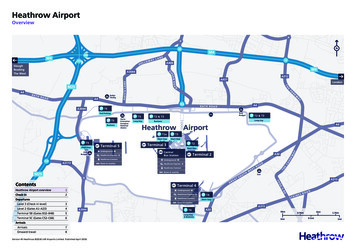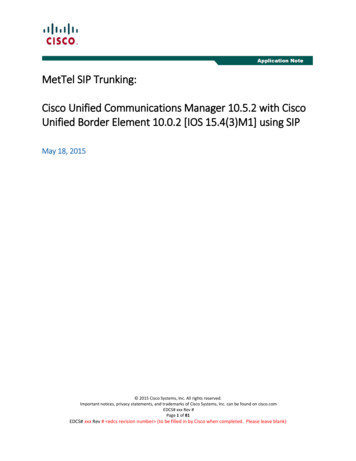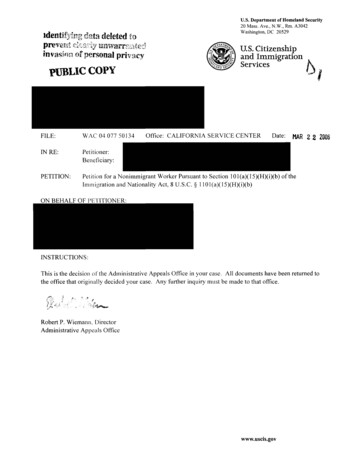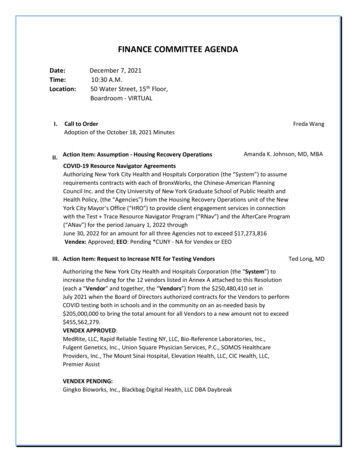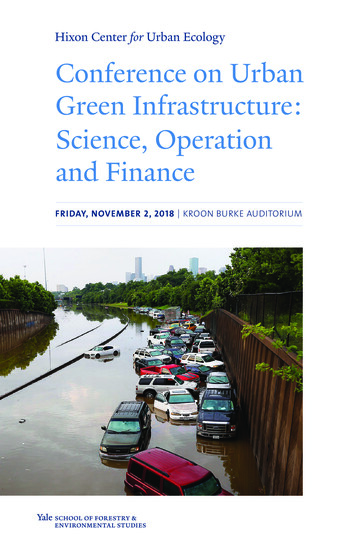
Transcription
Hixon Center for Urban EcologyConference on UrbanGreen Infrastructure:Science, Operationand FinanceFRIDAY, NOVEMBER 2, 2018 KROON BURKE AUDITORIUM
1Welcome & Panel I9:15 AM OPENING KEYNOTEGiovanni Zinn ’05 B.S.City of New HavenGiovanni Zinn, P.E. is the City Engineer for the City of New Havenas of 2014. As City Engineer, he has worked on many projects focusedon sustainable and livable infrastructure, including complete streets,encouraging alternative transportation options, adopting greeninfrastructure, designing resilient living shoreline installations, andreducing the City’s carbon footprint through aggressive energy reduction.Prior to leading the Engineering Department, Giovanni also served as aproject manager for the City of New Haven’s Engineering Departmentand Office of Sustainability and managed environmental programs forthe City Plan Department. Giovanni graduated from Yale College in 2005,and lives in New Haven with his wife Megan and their three little boys(who keep them very busy!).9:45 AM PANEL I: ACTIONABLE SCIENCE:GREEN INFRASTRUCTURE PERFORMANCEWhat is the science telling us about the opportunities and challengesfor green infrastructure to help cities improve their performanceon water, temperature and public health issues? How should webe thinking across scales–from individual green infrastructureinstallations to networks of green infrastructure units across differentneighborhoods in a city? What are the major questions that still needto be answered as cities think about investing in green infrastructure,either alone or in combination with more traditional/ “grey”infrastructure?Gaboury Benoit, Ph.D. moderatorYale School of Forestry & Environmental StudiesGaboury Benoit is the Grinstein Professor of Environmental Chemistry atYale’s School of Forestry and Environmental Studies, where he has servedas the Associate Dean for Research and Director of Doctoral Studies. Hehas a joint appointment in Yale’s Environmental Engineering program. Hefounded Yale’s Center for Coastal and Watershed Systems in 1992 and actedas its faculty director. He is also faculty director of Yale’s Hixon Centerfor Urban Ecology. Dr. Benoit received his bachelor’s degree from Yale’sDepartment of Geology and Geophysics where he studied environmentalchemistry. After working for three years in an independent environmentalconsulting firm, he earned a master’s in Water Resources Engineering fromMIT (1985) and a PhD in environmental chemistry from the M.I.T.-WoodsHole joint program (1988). Gabe is a nationally recognized expert onenvironmental chemistry and the impacts of land development on water.Hixon Center for Urban EcologyRecent research includes urban environmental issues and watershed basedstudies of nonpoint source pollution. Among his many publications, heco-authored the book New Strategies for America’s Watersheds: IntegratingEcological, Economic, and Social Factors that was published by NationalAcademy Press in 1998. Another important recent publication is the bookLand and Natural Development (L.A.N.D.) Code, co-authored with DianaBalmori of Yale’s Architecture School, and which is a set of guidelines forsustainable land development.Kim DiGiovanni, Ph.D.Quinnipiac UniversityKimberly DiGiovanni, PhD is an Assistant Teaching Professor of CivilEngineering at Quinnipiac University (Hamden, CT). Dr. DiGiovanni’sresearch interests and focus include the eco-hydrology of naturalvegetated spaces and engineered urban green spaces or green stormwaterinfrastructure. Her experience includes the design, implementation,maintenance and management of intensive site and block scale monitoringinitiatives at dozens of sites across the Northeast United States includinglocations in Philadelphia PA, New York NY, and New Haven CT. Her workhas led to advancements in green infrastructure (GI) design, performancemonitoring, and quantification of GI benefits. Her collaborations span avariety of entities including both public and private agencies, educationalinstitutions, and non-profit organizations. She is the principal and ownerof Auroran Environmental LLC, where she serves as a consultant to theNYC DEP on GI research, design, and development. She was a US EPAfunded post-doctoral research fellow in the Department of Civil andEnvironmental Engineering at Villanova University. She is a graduate ofDrexel University’s doctoral program in Environmental Engineering, anNSF Graduate Research Fellow, and alumna of the Sustainable WaterResource Engineering Laboratory at Drexel University.Nooshin Razani, M.D.University of California, San FranciscoDr. Nooshin Razani is a pediatrician, researcher, and passionate advocateof the healing power of nature. She is the founder and director of theCenter for Nature and Health, based at UCSF Benioff Children’s HospitalOakland. The Center conducts original research related to nature andhealth, helps health care practitioners incorporate nature into their practice,and provides clinical care in nature. Dr. Razani is an attending physicianat UCSF Beniofff Oakland’s Ambulatory Department and AssistantClinical Scientist at Children’s Hospital Oakland Research Institute.Dr. Razani attended medical school at University of California SanFrancisco, completed a pediatric residency at UCSF Benioff Children’sHospital Oakland, and has a Masters in Public Health from the HarvardSchool of Public Health. Dr. Razani has conducted primary research on theclinical applications of nature; given presentations about nature and healthacross the U.S., and published peer reviewed articles about the topic.2
3Panel IIHixon Center for Urban EcologyVivek Shandas, Ph.D.Gerald Bright ’08 M.E.Sc.Portland State UniversityPhiladelphia Water DepartmentVivek Shandas is a Professor of Urban Studies and Planning and theResearch Director for the Institute for Sustainable Solutions at PortlandState University. Dr. Shandas’ research aims to address policy relevantquestions by examining the feedbacks among urban form, governancesystems, and human health and well-being. Dr. Shandas serves as Chairof the City of Portland’s Urban Forestry Commission, and is a Principal atCAPA Strategies, LLC, a global consulting group that helps communitiesprepare for climate-induced disruptions.Gerald W. Bright Jr. is an Environmental Scientist Supervisor with thePhiladelphia Water Department (PWD) and has served as the managerof the Green Stormwater Operations unit since the fall of 2012. Prior to2012, he worked within PWD’s Ecological Restoration Group as a projectmanager focusing on the physical and biological monitoring of PWD’sstream restoration and wetland creation projects; two-dimensionalhydrodynamic and habitat modeling as well as public education andoutreach at local schools, environmental centers and community groups.At Howard University, his research experience included work on juvenileblue crab (Callinectes sapidus) habitat utilization at the SmithsonianEnvironmental Research Center as well intraspecific competition in theinvasive Rusty crayfish (Orconectes rusticus) in Baltimore’s Long TermEcological Research system. He has also conducted field studies relatingto the effects of urbanization on aquatic ecosystems and modeling solutetransport in ground and surface water systems. In 2008 he graduated fromthe Yale School of Forestry and Environmental Studies with a Master’sdegree in Environmental Science. His primary interests are stormwatermanagement, urban renewal, the effects of urbanization on streamecology and in-stream hydraulics, environmental justice and local politics.Gerald is a Philadelphia native, who endeavors to one day consolidate hismultidisciplinary education and experience in a way that will allow himto help usher underrepresented neighborhoods and communities into theforefront of both the environmental and sustainability movements.11:00 AM COFFEE BREAK11:15 AM PANEL II: PERSPECTIVES ON OPERATIONS:ADDRESSING GI COSTS AND CAPTURINGBENEFITSHow are existing green infrastructure installations working in citiesand at company facilities? In what circumstances are they meetingperformance standards at a lower cost than more traditionalapporaches–and where are they not? Are they meeting applicableregulatory standards–and where are they not? What are the mostpressing questions facing efforts to improve the benefits and addressthe costs of their operational performance?Caitlin Feehan ’14 M.E.M. moderatorCity of Alexandria, VAAt Alexandria Renew Enterprises (the wastewater agency in Alexandria,Virginia), Caitlin Feehan serves as the Program Manager for RiverRenew,the program constructing a tunnel system to reduce overflows fromAlexandria’s combined sewer system. In her role, Caitlin oversees theprogram planning and engineering design of the tunnel system andwill eventually oversee construction. Prior to this role, she served as theAssistant Green Infrastructure Manager for DC Water’s green infrastructureprogram and oversaw the engineering design, procurement, and programimplementation of 45 million in green infrastructure projects. Shealso previously worked for an engineering firm and has over 10 years ofexperience working on water management, predominantly focused oncombined sewer system management. She holds a master’s degree inEnvironmental Management from Yale University’s School of Forestryand Environmental Studies and a bachelor’s degree in EnvironmentalEngineering from Northwestern University.Jennifer Molnar ’04 M.E.MThe Nature ConservancyAs managing director and lead scientist of The Nature Conservancy’s newCenter for Sustainability Science, Jen provides thought leadership onimproving society’s ability to create a more sustainable future for natureand people, including through corporate practices and policy. The Center isfocused on enabling transformative change by filling science gaps that areinhibiting large-scale uptake and implementation of sustainability solutionsvia corporate practices and policy. Jen has 15 years of experience bringingscience to decisions that improve the state of the natural world and howpeople depend on it, including through research, global assessments,corporate practice innovations, and environmental remediation. She isthe science lead for the TNC-Dow Chemical Company collaborationto incorporate nature and the value it provides to people into corporatedecision-making. This work has led to Dow’s ground-breaking ten-yearValuing Nature Goal – a commitment to consider nature in all of theFortune 50 company’s capital, R&D, and real estate decisions by 2020,while aiming to generate 1B in business value from projects that aregood for business and good for ecosystems.4
5Panel IIIHixon Center for Urban EcologyPaula Conolly, AICP ’18Jeff DiehlGreen Infrastructure Leadership ExchangeRI Infrastructure BankPaula Conolly, AICP, is committed to making green stormwaterinfrastructure work in communities across North America. She is theDirector of the Green Infrastructure Leadership Exchange (Exchange),a peer learning network of municipalities, water utilities, and countiesseeking mainstream green stormwater infrastructure. Prior to theExchange, she led policy initiatives for Philadelphia’s renowned GreenCity, Clean Waters program, helping to change “business as usual”to implement over 30 acres of green stormwater infrastructure onvacant lands, parks, streets and private property. Ms. Conolly helped tospearhead a state-of-the art drinking water protection program for theCity of Philadelphia, helping to raise over 3M to improve and protect theSchuylkill River Watershed. Prior to that, Paula consulted on public healthand environmental initiatives at Booz Allen Hamilton. Paula is a graduateof the University of Notre Dame.Jeffrey R. Diehl is the Executive Director and CEO of Rhode IslandInfrastructure Bank, a quasi-state agency whose mission is to invest in keyinfrastructure in the State of Rhode Island including programs focusedonclean water, drinking water, road and bridge, brownfield remediation,energy efficiency and renewable energy projects for municipalities, quasistatea gencies, commercial and residential property owners. Mr. Diehl hasover 35 years ofexperience in public finance and prior to this role was theManaging Partner of Strategic Sovereign Advisors LLC, a consulting firmadvising governments and financial institutions. Previously, he held varioussenior positions at HSBC, a global financial institution, including ViceChairman –US Public Sector and Global Head of Public Sector Banking.He holds BA and MBA degrees from the University of Michigan.Michelle Kondo, Ph.D.USFS Urban Field Station12:30 PM LUNCH BREAK1:45 PM PANEL III: PUBLIC FUNDINGWhat sources of public funding are most used by cities when installinggreen infrastructure? What are the limits on those sources? What newand additional sources can and should be explored or created?David Kooris moderatorState of ConnecticutDavid Kooris is Director of Rebuild by Design and National DisasterResilience for the State of Connecticut. These Federal grants, totaling 65 million, will enable resilience planning for Fairfield and NewHaven Counties and the construction of several pilot projects for greeninfrastructure, raised mobility corridors, distributed energy generation,and 21st Century flood protection in Bridgeport. Prior to this position,Mr. Kooris was Director of the Office of Planning and EconomicDevelopment for Connecticut’s most populous city, Bridgeport. This roleenabled him to chart a long-range strategy for the city’s revitalizationgrounded in its diverse neighborhoods, spur economic developmentin its downtown and commercial centers, and reposition thousands ofacres of brownfields for sustainable redevelopment. Before assumingthat appointment, Mr. Kooris held various positions at Regional PlanAssociation, the nation’s oldest regional planning organization, culminatingin his role as Vice President. Mr. Kooris has worked on high-speed railoriented development, sustainability planning, and urban revitalizationprojects abroad in Canada, Turkey, Morocco, Spain, Mexico, Peru, Taiwan,and South Korea. Since the fall semester of 2012, Mr. Kooris has been alecturer at Yale University’s Graduate School of Forestry and EnvironmentalStudies in city and regional planning practice.Michelle Kondo, PhD, is a research social scientist with the USDA-ForestService, Philadelphia Field Station. Her research focuses on place-basedstrategies for disease, violence, and injury prevention, most often in thecontext of legacy cities and low-resource communities in urban areas. Shehas conducted research on the impacts of blight remediation programs,abandoned building abatement, green stormwater infrastructure, vacantlot greening, and tree plantings on crime and violence outcomes, as wellas on health and health inequalities. She has published meta-analyses onthe state of research on urban green space and nature-based interventionsas they relate to human health and safety, and on neighborhood-basedinterventions as they relate to violence and violence prevention. Her workhas received awards from the US EPA Office of Research and Development,and by the Sustainable Business Network of Greater Philadelphia, and hasbeen covered in outlets including NPR, Science, the New Yorker, TIME,the Conversation, and Philadelphia Inquirer. Dr. Kondo holds a PhDin urban design and planning, and completed a postdoctoral fellowshipin epidemiology.Rebecca French, Ph.D.CT Department of Housing and Urban DevelopmentRebecca French, Ph.D. is the Director of Resilience for the ConnecticutDepartment of Housing. In this role she oversees a 54.3M grantawarded to the State through the US HUD National Disaster ResilienceCompetition and the 10M Rebuild by Design pilot project to addressacute and chronic flooding in the South End of Bridgeport, CT and preparea regional resilience plan. She represents the agency on the Long TermRecovery Committee, the State Agencies Fostering Resilience Council andthe Governor’s Council on Climate Change. Previously she was the Directorof Community Engagement for the Connecticut Institute for Resilience andClimate Adaptation, a partnership between the University of Connecticutand the Connecticut Department of Energy and Environmental Protection.She was a AAAS Science & Technology Policy Fellow with the U.S. EPA6
7Panel IVHixon Center for Urban EcologyOffice of Research and Development and an American Geophysical UnionCongressional Science Fellow in the United States Senate. Dr. French holdsa B.A. from Oberlin College in chemistry and environmental studies, anM.S from Cornell University in soil chemistry and received her doctoratefrom Virginia Tech in geosciences. She is a native of northeast Connecticutand is married to Mark Derks. They live in Waterford and have one babyboy named Calder.EEEIG, he was Managing Director and Head of Americas, Project Financefor Natixis, part of Groupe BPCE, 2nd largest French banking group. Heis an Executive Fellow at the Yale School of Management and serves on theAdvisory Committee for the Yale Initiative on Sustainable Finance. He isthe strategic advisor to the UN on Climate Aggregation Platform initiative,a global structured finance initiative aimed at reducing barriers in financialaggregation of small-scale, distributed low-carbon projects to access capitalmarkets. He has an MBA (Yale), MS in engineering (Clemson) and BS inengineering (Indian Institute of Technology) and is a CAIA charterholder.3:00 PM PANEL IV: PRIVATE FUNDINGHow are cities tapping into private sources of finance to help fund theirgreen infrastructure work? What are the limits on those sources? Whatnew and additional sources can and should be explored or created?Brad Gentry moderatorYale School of Forestry & Environmental StudiesBrad Gentry’s work explores the opportunities for using private investmentto improve environmental performance. He works both across and withinparticular sectors/problems. The cross-sectoral work focuses on the stepspolicy makers can take to help develop opportunities for sustainableinvestments, including market frameworks, information systems, andshared investments/ partnerships. The sectoral work is concentrated inthree major areas: increasing private investment in the delivery of urbanenvironmental services (particularly drinking water and sanitation),sustainable forest management, and cleaner energy. Projects in all theseareas are undertaken across a range of contexts from New Haven, todeveloping country megacities and to wilderness forest systems. Hehas written extensively on the links between private investment andenvironmental performance, including the book Private Capital Flowsand the Environment: Lessons from Latin America.Anadi JauhariEmerging Energy and Environment Investment GroupAnadi Jauhari is a Senior Managing Director at Emerging Energy andEnvironment Investment Group (EEEIG), a New York-based alternativeinvestment firm specializing in emerging infrastructure, sustainability andprivate markets investing. In his current role, he heads the development ofEEEIG’s infrastructure strategy. He co-led the development of EmergingEnergy Latin America Fund, a small scale renewable and clean energy infraproject equity fund, which completed its investment mandate in 2016/17.His team is working on investments opportunities in decentralized anddistributed infrastructure. He is also responsible for directing EEEIG’sinvestment research in infra investing, sustainability, and green impactmetrics. He has over 20 years of experience in private markets and hasworked in the Americas, Africa and Asia, with a broad focus infrastructureincluding renewables, clean energy, power, natural resources, andtransportation. He specializes in project finance, risk management, andinvestment underwriting in developed and emerging markets. Prior toBenjamin Cohen ’17 M.E.M./M.B.A.Quantified VenturesBenjamin Cohen is a Senior Associate with Quantified Ventures, an impactinvestment intermediary that specializes in outcomes-based financingapproaches, particularly Social and Environmental Impact Bonds, andhelped pioneer this approach to finance green infrastructure through itswork on DC Water’s 2016 Environmental Impact Bond. As part of the firm’senvironmental team, Mr. Cohen leads resilient infrastructure investmentsacross the United States to scale urban green infrastructure to managestormwater, as well as for coastal wetland restoration to reduce risks fromstorm surge and sea level rise, and economic resilience by providing greenemployment opportunities in Rust Belt cities. He previously worked ongreen infrastructure finance as an MBA intern at Encourage Capital, andalso has experience in resilience issues internationally through his work atthe UN Development Programme’s global climate adaptation team and as aFulbright Scholar researching climate vulnerability in Nepal. He is an alumof the dual Master of Environmental Management and MBA program atYale, and also holds a Bachelor’s degree in Biology from Williams College.Ricardo BayonEncourage CapitalRicardo Bayon is a Partner and a member of the Board of Directors ofEncourage Capital. Ricardo leads the water team and new business andinnovation at Encourage and works across several other investmentsectors. Ricardo is a member of the Investment Committee of theEKO Green Carbon Fund. Prior to co-founding EKO in 2007, Ricardohelped found and served as the Managing Director of the EcosystemMarketplace, a web site and information/analysis service covering theemerging environmental markets. In that capacity he co-authored anumber of publications on voluntary carbon markets, mitigation banking,and ecosystem services, including The State of Voluntary CarbonMarkets 2007: Picking up Steam and Voluntary Carbon Markets: AnInternational Business Guide to What They Are and How They Work,and Conservation and Biodiversity Banking: A Guide to Setting Up andRunning Biodiversity Credit Trading System. For nearly two decades hehas specialized on issues related to finance, banking, and the environment.He has done work for a number of organizations, including InsightInvestments, the International Finance Corporation (IFC) of the WorldBank, IUCN, The Nature Conservancy, Domini Social Investment, amongothers. His articles have appeared in publications such as The Washington8
9Closing RemarksPost, The Atlantic Monthly, and the International Herald Tribune. He hasalso written numerous publications and chapters on mitigation banking,biodiversity markets, markets for water quality, and other environmentalmarkets. He was born in Bogota, Colombia, and is currently based in SanFrancisco. Ricardo graduated with a B.A. degree from Brown University.4:15 PM CLOSING REMARKSMurali Chandrashekaran, Ph.D.Vice Provost,University of British Columbia (UBC), Canada, and theFred H. Siller Professor of Behavioural Science at UBC’s Sauder School of BusinessMurali Chandashekaran is the Vice Provost (International), at theUniversity of British Columbia (UBC), Canada, and the Fred H. SillerProfessor of Behavioural Science at UBC’s Sauder School of Business. AsVice-Provost (International), Murali’s service focuses on advancing UBC’sinternational strategic priorities, shepherding the university’s diverse andcomplex international activities on two campuses that serve as home toover 60,000 students and over 15,000 faculty and staff. He is also VisitingProfessor of Business Administration at the Yale School of Management,and Senior Research Fellow in the Global Network for AdvancedManagement (GNAM; http://advancedmanagement.net, a network of29 leading international business schools from diverse regions, countries,cultures, and economies in different phases of development, seeking toleverage interconnectedness of global institutions to develop global leadersfor coming decades). Murali serves on the UBC Taskforce for the creationof a School of Public Policy and Global Affairs, and is an active memberof the steering group of the Highly Integrative Basic and ResponsiveResearch (HIBAR) Initiative, which seeks to, in collaboration with otheruniversities, implement programs and strategies to catalyze visionary useinspired collaborative research. Believing deeply in the idea that universitiescan play a central role in building a more just and prosperous world, heseeks to develop and nurture global collaborative networks with academicinstitutions, corporates, communities, cities and countries, break downsilos, and bring diverse stakeholders together to help increase the societalimpact of universities. Murali is widely published in leading academicbusiness journals in the areas of metrics (specifying models to capturevarious market phenomena) and valuation (estimating the impact ofassets and investments on market-based outcomes). His current researchis in the area of resilience valuation and asset management – specifyingmeasures, monitoring systems, and estimation models to derive metricsthat capture the short-term and long-term impact of assets and investmentson resilience of neighborhoods, cities and regions. He lives in Vancouverwith his wife and three daughters, and has taken up competitive curling asa new hobby.Hixon Center for Urban Ecology10
schedule of events8:45– 9:15 AM REGISTRATION AND BREAKFAST9:15 – 9:45 AM OPENING KEYNOTEGiovanni Zinn ’05 B.S., City of New Haven9:45 – 11:00 AM P ANEL I: ACTIONABLE SCIENCE:GREEN INFRASTRUCTURE PERFORMANCEGaboury Benoit, Ph.D., Yale School of Forestry & Environmental StudiesKim DiGiovanni, Ph.D., Quinnipiac UniversityNooshin Razani, M.D., University of California, San FranciscoVivek Shandas, Ph.D., Portland State University11:00 – 11:15 AMCOFFEE BREAK11:15 – 12:30 PM ANEL II: PERSPECTIVES ON OPERATIONS:PADDRESSING GI COSTS AND CAPTURING BENEFITSCaitlin Feehan ’14 M.E.M., City of Alexandria, VAGerald Bright ’08 M.E.Sc., Philadelphia Water DepartmentJennifer Molnar ’04 M.E.M., Quinnipiac UniversityPaula Conolly, AICP ’18, Green Infrastructure Leadership Exchange12:30 – 1:45 PMLUNCH1:45 – 3:00 PM PANEL III: PUBLIC FUNDINGDavid Kooris, State of ConnecticutJeff Diehl, RI Infrastructure BankMichelle Kondo, Ph.D., USFS Urban Field StationRebecca French, CT Department of Housing and Urban Development3:00 – 4:15 PMP ANEL IV: PRIVATE FUNDINGBrad Gentry, Yale School of Forestry & Environmental StudiesAnadi Jauhari, Emerging Energy and Environment Investment GroupBenjamin Cohen ’17 M.E.M./M.B.A., Quantified VenturesRicardo Bayon, Encourage Capital4:15– 4:45 PM C LOSING REMARKSMurali Chandrashekaran, Ph.D., Vice Provost, University of British ColumbiaPrinted on responsible paper by a responsible printer.
at UCSF Beniofff Oakland's Ambulatory Department and Assistant Clinical Scientist at Children's Hospital Oakland Research Institute. Dr. Razani attended medical school at University of California San Francisco, completed a pediatric residency at UCSF Benioff Children's Hospital Oakland, and has a Masters in Public Health from the Harvard

